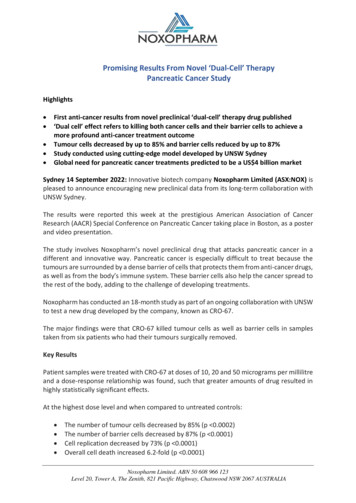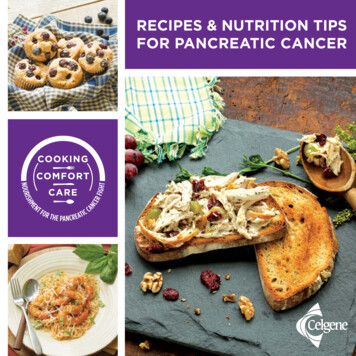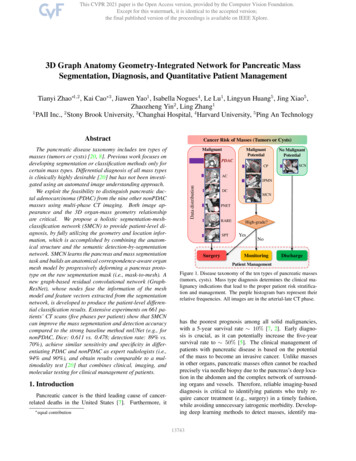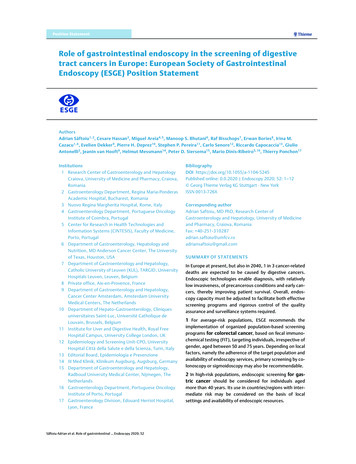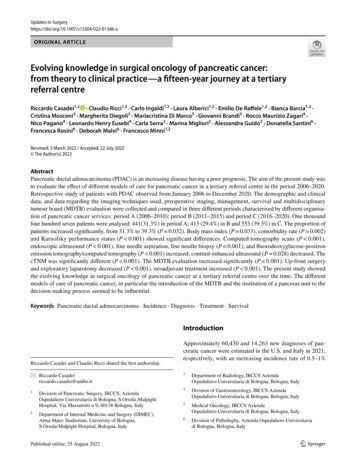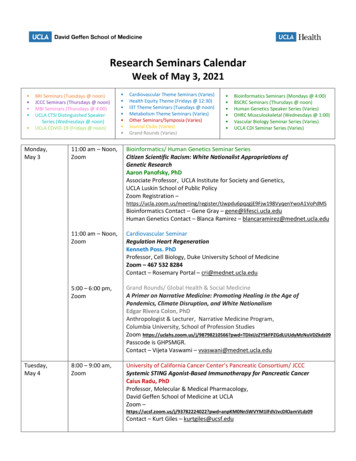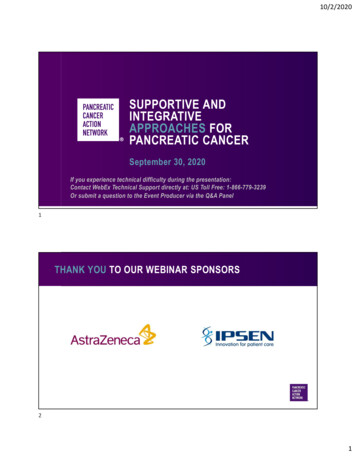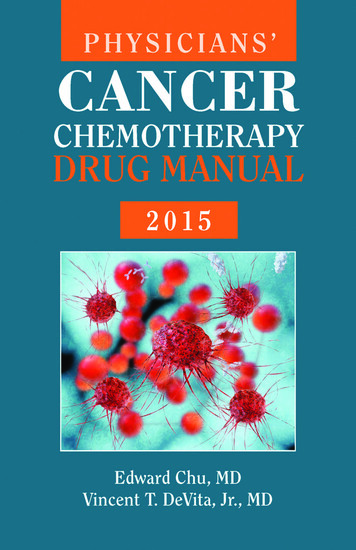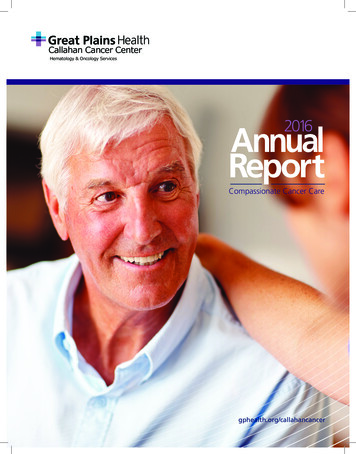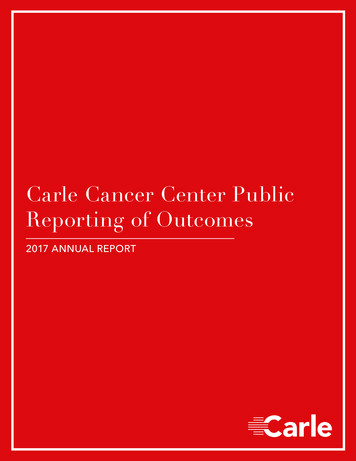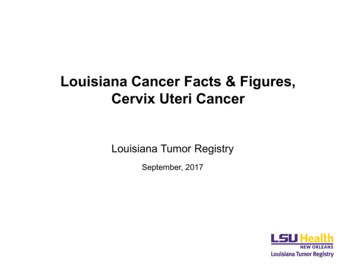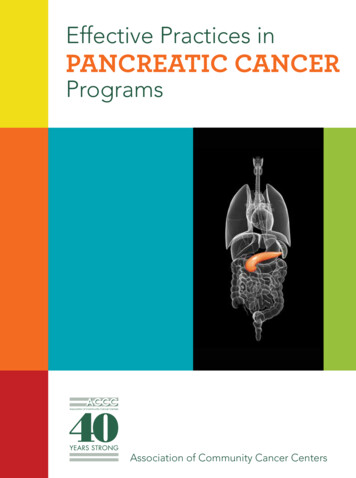
Transcription
Effective Practices inPANCREATIC CANCERProgramsAssociation of CommunityCentersEffective Practices in CancerPancreatic CancerPrograms n1
AcknowledgementsThe Association of Community Cancer Centers (ACCC) would liketo acknowledge and thank the members of the PANCREATIC CANCERADVISORY COMMITTEE who contributed their valuable time and expertiseto this education project.Malcolm Bilimoria, MD, FACSChief of Pancreas and Hepatobiliary SurgeryDirectorIllinois Center for Pancreatic and Hepatobiliary DiseasesAnitra EngebretsonDirector, Patient Services & Medical RelationsPancreatic Cancer Action NetworkColleen Gill, RD, CSOOutpatient DietitianUniversity of Colorado Cancer CenterMaggie K. Hughes, LMSWOncology Social WorkerWinship Cancer Institute of Emory UniversityGeorge Kim, MDAssociate Professor of OncologyMayo ClinicZaven Norigian, PharmDClinical Pharmacy CoordinatorBeth Israel Deaconess Medical CenterFaye Satterly, RN, BSN, CRNIDirector, Cancer and Palliative Care ServicesMartha Jefferson Cancer Care CenterGina M. Zilio-Smith, BSN, RN, OCN, CHPNUpper GI Patient NavigatorMaine Medical Center Cancer InstituteACCC StaffAmanda Kramar, Director, Provider EducationMonique J. Marino, Manager, PublicationsAmanda Patton, Manager, CommunicationsBrissan Guardado, Program Manager, Provider EducationJillian Kornak, Editor 2014. Association of Community Cancer Centers. All rights reserved. No part of this publication2may be reproducedor transmitted in any form or by any means without written permission.n Association of CommunityCancer Centers
This publication is part of ACCC’s “Improving Quality Care in Pancreatic Cancer”education program. ACCC is pleased to partner on this education program with thePancreatic Cancer Action Network (PanCAN), a nationwide network of supporters workingtogether to advance research, support patients, and create hope for those affectedby this disease. Financial support of this education program is provided by Celgene.ACCC is soley responsible for content.Table of Contents3 Highlights of ACCC’s PancreaticCancer Survey4 Winthrop-University Hospital,Institute for Cancer Care6 Maine Medical Center CancerInstitute8 Kellogg Cancer Center,NorthShore University HealthSystem10 Winship Cancer Instituteof Emory University12 The Virginia G. Piper CancerCenter at ScottsdaleHealthcareEffective Practices in Pancreatic Cancer Programs n 1
CYCME/CEAcute PromyelocyticLeukemia (APL)ACCC CancerProgram GuidelinesCancer NutritionDispensingPharmacyWeb-based CME/CEOpportunitiesChronic MyeloidLeukemia (CML)Molecular TestingGastric CancerMelanomaMultiple MyelomaMyelofibrosisPancreatic CancerPayment Systems(Town Halls)Transitions BetweenCare SettingsFinancial Advocacy& AssistancePatient NavigationSurvivorshipOncologyPharmacy EducationNetwork (OPEN)Trends inCommunity CancerCentersProstate Cancer2ResourcesandtoolsforCentersthe multidisciplinary teamn Association ofCommunityCancer
Highlights of ACCC’sPancreatic Cancer SurveyAbout 45,000 people in the U.S. are diagnosed annually withpancreatic cancer; the disease is the fourth leading cause ofcancer-related deaths. Despite the high numbers and devastatingtoll of the disease on patients and their families, practice patternsand resources for patients with pancreatic cancer are not wellestablished. In 2013 ACCC conducted a survey to identify:n Barriers to caring for pancreatic cancer patientsn Gaps in provider knowledge and resources about pancreaticcancern Effective practices and components of strong pancreatic cancerprogramsn Community Resource Centers for pancreatic cancer.This publication describes the information gathered from this survey.Survey ResultsA total of 104 survey responses were returned. The majorityof respondents were social workers (26 percent), oncology nurses(24 percent), and dietitians (20 percent) in hospital-based and outpatient cancer centers. Ten percent were patient navigators. Otherteam members included: practice managers or practice administrators (8 percent), cancer program administrators (4 percent), medicaloncologists (4 percent), palliative care specialists (2 percent), andhematologic oncologists (2 percent). More than 60 percent of surveyrespondents reported seeing from 21 to 100 patients with pancreaticcancer each year.Findings showed that a strong community-based pancreatic cancerprogram includes a multidisciplinary team and the presence oftumor boards, an engaged support staff (nurses, navigators, andsocial workers), and expert physicians, as well as access to clinicaltrials and financial assistance programs. Seventy-six percent ofrespondents stated that pancreatic cancer cases are reviewed ina multidisciplinary manner in their cancer program. Of those centersusing a multidisciplinary team approach to treating pancreatic cancer patients, the team included a medical oncologist (96 percent);radiation oncologist (89 percent); oncology nurse (79 percent); andpathologist (77 percent).The National Comprehensive Cancer Network (NCCN) ClinicalPractice Guidelines for pancreatic cancer are the most used guidelines, followed by the American Society of Clinical Oncology (ASCO)guidelines. Most respondents use pancreatic cancer resources andtools from the American Cancer Society and the National CancerInstitute, followed by PanCAN, NCCN, and ASCO.Challenges & Barriersincluded keeping current on the latest treatment modalities andthe lack of psychosocial services and/or distress management programs for patients. A few respondents noted the lack of affordablenutrition counseling and overworked nurse navigators who havemultiple roles within the community-based cancer program setting.Time was the overwhelming barrier to learning and change as notedby 81 percent of respondents. Lack of support, such as financialand managerial, was noted by 44 percent. “Other” barriers cited byrespondents were lack of staff and new and complicated electronichealth records.Additional Education NeededRespondents indicated that additional educational resourcesand tools that would be beneficial include patient brochures, ananatomical picture to illustrate the location of the disease topatients, and an assessment and tracking tool for newly diagnosedpatients. Survey respondents also requested additional educationon treatment options and treatment planning for pancreatic cancerpatients. When asked to rank educational topics they viewed asessential in terms of the benefit they would receive from additionaleducation, respondents are seeking additional information on:n Treatment planning for resectable disease (60 percent)n Neoadjuvant treatment options (51 percent)n Financial assistance (50 percent)n End-of-life care (48 percent)n Palliative care (45 percent)n Classification and staging (43 percent)n Home/community support during treatment or postoperative care (41 percent).Community Resource CentersThrough survey responses, ACCC identified five member programswith experience and expertise in treating patients with pancreaticcancer. In this publication, these programs share practical strategiesand insight into improving the delivery of quality care to patientswith pancreatic cancer and their families. These programs will alsoserve as Community Resource Centers for ACCC’s “ImprovingQuality Care in Pancreatic Cancer” education project, answeringquestions and providing guidance to cancer programs with lessexperience in treating patients with pancreatic cancer. Go towww.accc-cancer.org/CRC to contact any of these programs.n Winthrop-University Hospital, Institute for Cancer Care,Mineola, N.Y.n Maine Medical Center Cancer Institute, Portland, Mainen Kellogg Cancer Center, NorthShore University Health System,Evanston, Ill.n The Virginia G. Piper Cancer Center at Scottsdale Healthcare,Scottsdale, Ariz.n Winship Cancer Institute of Emory University, Atlanta, Ga.The biggest challenge (56 percent) facing survey respondents isthe patient’s own structural, financial, and/or personal barriers, suchas transportation or insurance issues, followed by managing transitions of care between numerous healthcare settings (50 percent).Additional challenges for the cancer care team in treating andsupporting patients with pancreatic cancer and their familiesEffective Practices in Pancreatic Cancer Programs n 3
NAVIGATION IS KEYWinthrop-University Hospital,Institute for Cancer CareMineola, N.Y.A strong community-based pancreatic cancer program includes a multidisciplinaryteam, as well as tumor boards, expert physicians, and an engaged support staff.The Winthrop-University Hospital Pancreas Program in Mineola, N.Y., has all thatand more.Recognized as a Center of Excellence by the American College of SurgeonsCommission on Cancer, multidisciplinary communication underpins state-ofthe-art technologies and strong research affiliations at the Winthrop-UniversityHospital Pancreas Program. Weekly tumor conferences bring the varied perspectives of medical and radiation oncologists, surgeons, advanced endoscopists,interventional and diagnostic radiologists, nurses, nutritionists, pathologists, andnurse navigators to discuss and direct a treatment plan tailored to each patientwith pancreatic cancer.“Regular open communication keeps the conversation and collaboration goingamong the disciplines. Collaborative care helps us erode the fatalism that isso commonly expressed about patients with pancreatic cancer,” said ChristineGuarnieri, RN-BC, MSN, OCN, nurse navigator, colorectal/gastrointestinal andhead/neck cancers.Navigation is KeyWith her advanced training, Guarnieri is able to translatecomplex medical information for her patients to make thecancer experience understandable and manageable. Shetravels through the system with the patient, coordinatingcare. She likens her role as nurse navigator to the hub ofa wheel.“I’m in the center with the patient, sharing informationwith them, as well as keeping conversations going amongspecialties. My responsibility is to make sure everybodyis on the same page,” said Guarnieri. She communicateswith the entire multidisciplinary team, including genetics,pathology, nutrition, and social work, and also keepsoutside physicians, such as the patient’s primary carephysician or cardiologist, in the loop.Guarnieri builds a bond with her patients early on. She isthere with the patient at diagnosis and when the physicianleaves the room. “When we first meet, patients may saythis [diagnosis] is a death sentence. I answer that eachpatient responds differently to surgery, chemotherapy,and radiation. It’s not how much time you have left, butwhat you do with your time. I help patients define whatis most important in their lives and what we can do ona daily basis in the time we do have.”4n Association of Community Cancer CentersAs treatment progresses, Guarnieri will have multipleconversations with each patient about his or her presentstate of physical and emotional health. If patients aredoing well, she may speak with them once a week. Whentreatments fail or become more challenging, those conversations can increase up to three or four times per week.Guarnieri’s emphasis is on how best to help each patientmaintain a good quality of life, so she pays careful attention to her patients’ psychosocial and nutritional health, aswell as their physical health. “We want the patient to havethe best possible quality of life. Our goal is to maximizeoutcomes for each patient and make pancreatic cancera controllable illness,” she said.Guarnieri, in collaboration with other oncology nursenavigators, developed a tool to quantify the cancerpatient’s satisfaction. The tool is used to assesshow navigation services helped patients in their overallcancer journey. Some sample questions from the surveyevaluate if the patient received navigation services ina timely manner, if intervention by the navigator washelpful, if the connection with the navigator improvedthe patient’s overall cancer care experience at Winthrop,and if the navigation resource helped keep them fromseeking care elsewhere. The tool is available online atwww.accc-cancer.org/pancreatic.
Access to Clinical Trials & Leaderswith Specialized ExpertiseCommunity cancer programs are challenged to keepup with the availability of clinical trials for patients withpancreatic cancer. Winthrop, a 591-bed teaching hospital,has an active cancer clinical trials program that offersa broad array of options to patients with cancer, throughits affiliations with the Southwest Oncology Group(SWOG) of the new National Cancer Trials Network(NCTN), Gynecologic Oncology Group, and the CTSU(Clinical Trials Support Unit). At weekly tumor boards, themulti disciplinary team reviews those clinical trials mostappropriate for its patients with pancreatic cancer.Committed to research, as well as to medical education,the hospital is a clinical campus of Stony Brook UniversitySchool of Medicine. Winthrop also has research affiliationswith Cold Spring Harbor Laboratory and Roswell ParkCancer Institute.Although access to clinical trials is important to thesuccess of any pancreatic cancer program, physicianleaders with specialized expertise in treating gastroin testinal (GI) and hepatobiliary cancers are critical to aprogram of excellence. Thanks to a strong commitmentby hospital administration to recruit top physicians to itscancer program, Winthrop-University Hospital saw itssurgical pancreatic cancer population jump from 4 casesin 2012 to 51 over the last nine months, when surgicaloncologist John Allendorf, MD, joined the team.Previously at Columbia University Medical Center,Dr. Allendorf has pioneered several robotic andminimally invasive treatments for patients with pancreaticcancer who were previously thought to be untreatable.He became the driving force behind a new and streamlined pancreatic cancer program that expanded the rangeof treatment options the program offers patients.Members of the HBP(hepatobiliary/pancreatic)multidisciplinary cancerconference discuss a patient’scurrent health status, recentdiagnostic imaging, and futurerecommendations for treatment.Guarnieri, in collaborationwith other oncology nursenavigators, developed a toolto quantify the cancerpatient’s satisfaction.Today Dr. Allendorf works closely with StavrosStavropoulos, MD, director of Endoscopy and directorof the program in Advanced GI Endoscopy. Stavropoulosand his team offer extensive experience with a number ofinnovative procedures, including endoscopic ultrasound(EUS)-guided biliary drainage (EGBD), which can sparecertain patients from the need for percutaneous drainageand external drains and bags. Another integral component of this program is driven by the medical oncologyteam, which includes Alexander Hindenburg, MD, FACP,attending physician in the Division of Oncology andHematology. This team offers patients state-of-the-artchemotherapeutic and targeted treatments thatare individualized for each patient, providing patientcentered care. Drs. Allendorf, Stavropoulos, andHindenburg embrace the theory behind multidisciplinarycommunication, as well as the significant benefit thatnavigation brings to the patient.Patient Finances & InsuranceAn enormous challenge facing many cancer patients,including those with pancreatic cancer, is their ownfinancial and/or personal barriers, such as transportationor insurance issues. Winthrop-University Hospital hasa financial assistance program located conveniently inan office at the infusion center. Social workers, as wellas patient navigators at Winthrop-University HospitalPancreas Program, ease patient concerns about trans portation and insurance.“As a nurse, I wear many hats,” said nurse navigatorGuarnieri. She helps patients overcome emotional, social,and clinical barriers, as well as talk about transportationand insurance issues, and makes referrals as needed.Over the last four months, she has fielded many morequestions from patients about insurance changes.“I always tell patients if I don’t know the answer to aspecific [insurance] question, I will find the answer andtogether we will fix the issue. Having a cancer diagnosis isstressful enough. If I can alleviate some of the paperworkor phone calls for patients, I am happy to do so.”Guarnieri notes that the increased paperwork and letterwriting by nurses and oncologists to deal with chemotherapy and diagnostic testing insurance claim denials threaten to cut into the time they can spend with patients.Effective Practices in Pancreatic Cancer Programs n 5
COLLABORATIVE & COMPASSIONATE CAREMaine Medical Center Cancer InstitutePortland, MaineMaine Medical Center Cancer Institute provides comprehensive, multidisciplinarycare for patients with pancreatic cancer through the Pancreaticobiliary Centerwithin the Maine Digestive Health Center. No other hospital in Maine offers thisdepth and breadth of clinical expertise and experience in treating GI cancers.Maine Medical Center is the only hospital in the state, for example, with severalfellowship-trained surgical oncologists, three board-certified colorectal surgeons,and a group of highly trained GI endoscopy specialists. From January 2012to December 2013, Maine Digestive Health Center saw 171 patients withpancreatic cancer.“We are the go-to people in the state for care of patients with pancreaticcancer, because we have such a strong team of expert physicians,” said GinaM. Zilio-Smith, BSN, RN, OCN, CHPN, oncology nurse navigator, upper GI,at Maine Medical Center.Coordinated, Collaborative& Compassionate CareZilio-Smith credits strong physician champions for thesuccess of the pancreatic cancer program. Over the lastseveral years, surgical oncologist Lisa A. Rutstein, MD,FACS, and gastroenterologist Douglas A. Howell, MD,have encouraged “respectful collaboration” among allthe appropriate specialists involved in the evaluation andmanagement of pancreatic cancer. These specialists haveworked to streamline access to a range of advanced diagnostic and treatment services and to develop and refineevidence-based, best-practice protocols to ensure thatpatient care is consistent and well-coordinated.Nurse navigators provide annual educationand outreach to theircolleagues and thegeneral public.Zilio-Smith is shownhere presentingeducation, support,and literature forNovember’s PancreasCancer AwarenessMonth.6n Association of Community Cancer CentersToday, eight site-specific nurse navigators help cancerpatients during the diagnosis and staging process bycoordinating their care at Maine Medical Center. ZilioSmith provides information to help patients with pancreatic cancer make healthcare decisions. She assures patientsthat they are not alone and that she is available at everystep in the process from diagnosis to resolution. Her mainrole is to assess for barriers to safe and expeditious care,offering the support of social work, nutrition, psychiatry,American Cancer Society Navigation, and the Cancer Riskand Prevention Clinic at Maine Medical Center CancerInstitute. As part of the initial discussion, she takes eachpatient’s family history. If patients are concerned aboutgenetic risk for pancreatic cancer in other family members,she can refer them to the Cancer Risk and PreventionClinic. For some, a thorough risk assessment and geneticcounseling provide enough information to make a planfor lowering other family members’ risk of cancer. Abnormal genes may cause as many as 10 percent of pancreaticcancers and can cause familial pancreatitis as well.
With certifications inhospice and palliative care,as well as oncology nursing,supplements the extensive tutorial visit that the nursepractitioner provides the patient and family priorto surgery. This tool is available online at www.cancer-org/pancreatic.Zilio-Smith understands theAn Open Door Policy to Navigationunique needs of patientsMaine is one of the most rural states in the nation, andvast distances separate the northern part of the state fromthe southern. Some patients have never visited the cityof Portland. Some live in the woods or on islands; othersin small cabins and campers, said Zilio-Smith. Many cannot afford the gas to drive the long distances from theirhomes to Maine Medical Center, and others cannot afforda hotel room for family members. Social workers at MaineMedical Center and an American Cancer Society navigator work with the Ronald McDonald House, Gary’s House,Brackett House, and a number of local hotels to offer lowcost accommodations and discounted family rates.with pancreatic cancer.Patients with pancreatic cancer often arrive at the hospitaljaundiced, extremely ill, and worried. When patients comein for diagnostics, they are encouraged to stay overnightfor staging, which usually includes tissue analysis, a highlyspecific pancreas CT scan, an endoscopic ultrasound, anda diagnostic laparoscopy with the surgical oncologist.These exams can be completed in 48 hours. During thistime, Zilio-Smith develops a plan of care that includes thedate and time of an outpatient medical oncologist consultwithin the patient’s local community, literature abouttheir disease, contact information, and assurances thatpatients can call the nurse navigator with any questionsor concerns.With certifications in hospice and palliative care, as wellas oncology nursing, Zilio-Smith understands the uniqueneeds of patients with pancreatic cancer and the familydynamics of dealing with the disease. “Grief starts themoment of diagnosis,” she said. “Patients grieve aboutwhat might be or what might not be. I have conversationsthat are frank and honest, realistic but not completelywithout hope. Cancer has a way of taking control awayfrom patients and families. I try to help them put this inperspective and provide them with education and support. Sometimes it’s the not knowing that is the hardest.”For those patients who may have an aborted Whippleprocedure (pancreatoduodenectomy) or find surgery isnot an option, Zilio-Smith explains the details of palliativecare. She offers patients a consult with the medicalcenter’s highly trained team of pain and palliative carephysicians, who can guide them through the process,establish goals, and bring the family on board.Patients receive an American Cancer Society accordionfile “Health Manager” to help them better manage theirtreatment schedules and keep all documentation in oneplace. A binder of supportive information is available tocaregivers as well. Through a grant, the team has alsodeveloped a binder book for patients specific to theWhipple procedure. This binder includes a detailed outline of “before, day of, and after your surgery,” as well asinformation about what to expect during hospitalization,members of the treatment team, pain management, nutrition, rehabilitation, and leaving the hospital. This binderWith the many challenges particular to Maine’s ruralresidents, Zilio-Smith advocates an “open door policy”to navigation with her pancreatic cancer patients. “We tryto keep people in their community if that is in their bestinterest and helps their quality of life,” she said. “An opendoor policy to navigation means that most of my workas nurse navigator is in the outpatient world. SurgicalOncology and I work closely with medical and radiationoncologists and even rehab in local communities. Whenthese local physicians take the reins, I am still never farfrom the action. I remain with patients from diagnosisthrough resolution—whatever that resolution is, and Iencourage patients and their families to call me anytime.”Zilio-Smith follows her neoadjuvant patients as they moveto Maine Medical Center’s collaborating partners, including the Cancer Care Center of York County for radiationtreatment and Maine Center for Cancer Medicine, aprivate, regional medical oncology group, for chemotherapy. To make sure no patient falls through the cracks,Zilio-Smith calls community medical oncologists everyfew weeks and collaborates with regional centers innorthern New England through their navigators, oncologynurses, and medical oncologists to check patient treatment status. Regular updates allow her to arrange fortimely restaging and follow up with the surgeon. Finally,she assures that all pertinent documentation from MaineMedical Center is sent to the appropriate off-site physicians who may not have access to the Maine Health EPICelectronic health record system.Effective Practices in Pancreatic Cancer Programs n 7
A TEAM OF EXPERTSKellogg Cancer Center, NorthShore UniversityHealth SystemEvanston, Ill.A high level of collaborative expertise and standardization of care brings betteroutcomes. That’s the clinical philosophy of the Pancreatic Cancer Program at theKellogg Cancer Center at NorthShore University Health System (NorthShore),based in Evanston, Ill. Designated by the National Cancer Institute as one of only50 Community Clinical Oncology Programs, Kellogg Cancer Center is one of thebusiest clinical programs in the state of Illinois and the Midwest. More than 130patients with pancreatic cancer were seen in 2013. NorthShore is a four-hospitalsystem in Chicago’s northern suburbs, with NorthShore Evanston Hospital as theflagship. Kellogg Cancer Center has locations at three of its hospitals.Putting Together a Team of Experts“Pancreatic cancer is a complicated cancer with sucha low survival rate that you need a team with focusedand differentiated expertise,” said Mark S. Talamonti,MD, chairman of the Department of Surgery and theStanton and Margaret Rogers Palmer Chair of Surgeryat NorthShore. “For pancreatic cancer programs to beexcellent, you can’t have providers who dabble in thedisease. We’ve concentrated our expertise and our focuson a few experts who see a large number of patients.That theme is true, whether we are talking about interventional GI, surgical oncology, or medical oncology.”Physician leaders in the Pancreatic Cancer Programinclude Talamonti, as well as Robert Marsh, MD, director,Gastrointestinal (GI) Oncology, and gastroenterologistMick S. Meiselman, MD, chief, Advanced TherapeuticEndoscopy Section. These physicians work with a dynamicteam of oncology nurses, a GI-cancer nurse navigator,and a surgical nurse navigator, who turn the concept ofstandardization into a day-to-day reality.Evidence-based clinical pathways at NorthShore helpensure that there is no variation in the way patients withpancreatic cancer are cared for—from how surgery isperformed in the operating room to how patients aretreated post-operatively to how and when patientsreceive chemotherapy and fluid resuscitation. The teamuses stringent categorization standards, so that patientswho are surgical candidates are offered surgery andpatients who are not surgical candidates do not gothrough needless operations.8n Association of Community Cancer CentersThe Whipple procedure is a difficult and demandingoperation for both the patient undergoing surgery andthe surgeon. “Specialization and standardization havemade the biggest, most formidable surgical procedurein all of abdominal surgery better for patients,” saidTalamonti, who performs about 60 Whipple procedureseach year. Only he and surgeon Marshall Baker, MD, MBA,perform this surgery at NorthShore, working closely withthe same five nurses. On the floor, a standardized clinicalpathway specifically for these patients helps acceleraterecovery. “We standardize the way we do things, preoperatively, in surgery, and post-operatively in recovery. Thesame way—every time. Predictable and controllable,”said Talamonti.The hallmark of a successful pancreatic cancer programis a multidisciplinary, collaborative approach to decisionmaking. Although robust discussions take place duringweekly tumor board meetings at NorthShore, a betterapproach, said Talamonti, is to put physician teammembers together in the same space with the patient.“Tumor boards are not real-time for the patient,” saidTalamonti. At NorthShore, “we’re in the workroom withthe residents, nurses, and specialists from all the relevantdisciplines. We’re looking at the scans together, makingmultidisciplinary decisions with the gastroenterologist andthe medical oncologist, and doing so at the same timethat the patient is in the room with us. That’s what setsus apart from other programs.” NorthShore integratesphysicians from surgery, gastroenterology, and medicaloncology so that patients can see all the physicians at oneappointment in which a course of action is defined.
The hallmark of aAccess to Clinical Trialssuccessful pancreaticThe team at NorthShore is committed to enrollingpatients with pancreatic cancer on clinical trials, eventhough some patients newly diagnosed with pancreaticcancer may believe they require immediate surgery anddon’t have the will or the time to follow through with aresearch protocol, Talamonti noted. “The reality is thesepatients need to be staged appropriately with modernhigh-quality, three-dimensional imaging, and if eligible fora clinical protocol, be placed on that trial, especially oneof our neoadjuvant protocols, where chemotherapy and/orradiation are given before the surgery,” said Talamonti.cancer program is amultidisciplinary,collaborative approachto decision making.Collecting Data to Predict SuccessNorthShore has taken the power of the electronic medicalrecord (EMR) to a new level, turning patient records intoan actual research tool to help predict success or failurein treating patients with pancreatic cancer. More than300 discrete data elements are collected in both theambulatory and inpatient settings for each patient withpancreatic cancer seen in NorthShore’s multidisciplinaryclinic. Using the EPIC EMR system, NorthShore surgeonsenter variables related to estimated blood loss in theoperating room, operating room time, length of stayin the hospital, and complication rates after surgery,while the medical oncologists enter such variables aspreoperative neoadjuvant therapies, dose escalationsor reducti
6 Maine Medical Center Cancer Institute 8 Kellogg Cancer Center, NorthShore University Health System 10 Winship Cancer Institute of Emory University 12 The Virginia G. Piper Cancer . Evanston, Ill. n The Virginia G. Piper Cancer Center at Scottsdale Healthcare, Scottsdale, Ariz.
